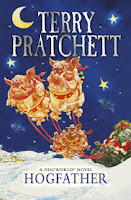There is the internal smile of appreciation. There is the light chuckle to one’s self. There is delightful giggling inside. All of these happen reading Terry Pratchett. The meta-mixing. The word play. The authorial voice. The double-entendres. The slap-stick. And there is the laugh out loud funny—moments that cause the reader to break the sacred silence of reading with actual-to-goodness, honest mirth. Certainly there are many Discworld books which have caused me to break this “fourth wall”, but perhaps none as much as Hogfather (1996).
In the days leading up to Hogswatchnight (the Disc’s equivalent of Christmas) in Ankhmorpork, things seem to be going as normal, that is, until a mysterious… thing shows up at the Assassin’s Guild with a massive sum of money in hand, and the most unique target whom they want dead. But things come off smoothly to the public, at least initially. With Death assuming the role of the Hogfather in the jolly man’s absence, children’s holiday wishes are heard, gifts are delivered, and the world seems to go round. Until it doesn’t. Susan Sto Helit hot on the trail of just where the Hogfather has been taken and getting to the bottom of who wants the Hogfather eliminated is an adventure that could only come from the pen of Terry Pratchett.
One after another, the scenes filling out this comedy of errors unravel in rich, belly-bustingly funny fashion. Death figuring out Christmas, the wizards looking for monsters, Mr. Teatime’s bumbling gang of thugs, and Susan’s investigation working with the oh god of hangovers are all sheer delight. When Pratchett gets credit for being one of the great comedy writers, Hogfather has to be near the top of the list of examples.
Pratchett being Pratchett, there is of course and underlayer of social commentary. The title making Pratchett’s views fairly obvious, the main thematic riff of Hogfather is the commercialism and commodification of our winter holidays. Skipping Christianity and getting to the true, Pagan roots of the holidays, Pratchett puts his skewers into both religious appropriation and materialism—a Dickensian sentiment on the value of family, friends, and kindness arising in the process. Through a certain lens, Hogfather is indeed something of A Christmas Carol for the contemporary world.
While the overarching theme of Hogfather may apply only to a very specific time of year, and like your favorite musical group’s Christmas album seem to warrant listening only in December, don’t worry; the novel transcends this. It can be read anytime, its message and content, while perhaps ringing a trifle more true during the holidays, are appreciable at any time. And the humor, oh gods, is front and center, and hilarious. I can only imagine the ho-ho-ho fun Pratchett had writing this novel…


One of my favourite books! Love the review. "One of after another, the scenes filling out this comedy of errors unravel in rich, belly-bustingly funny fashion." - time for a reread!
ReplyDelete